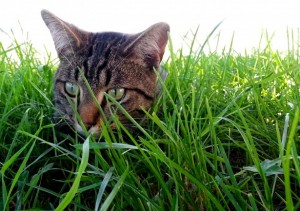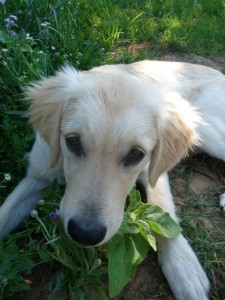Why Do Cats And Dogs Eat Grass?

Is there anyone who hasn’t wondered why cats and dogs eat grass? I know I’ve wondered about it.
There have been very few studies on why cats and dogs eat grass. However, in 2007, a group of researchers at the University of New England Dog Research Facility in Australia, did do one study on grass-eating in dogs. They took 12 beagles and divided them into two groups. One group was fed what they called a standard diet (aka canned commercial dog food). And, the other group was also fed a commercial canned dog food, except they added an ingredient to the food that would induce GI distress and diarrhea (all these dogs were people’s pets who volunteered their dogs for this study. Geez, who would want their dog to have forced nausea and diarrhea?). The researchers gave the dogs two species of grass to choose from: Kikuyu and Couch Grass.
They would feed the dogs the food, bring out the grass in a pot, and watch what would happen next.
They observed that both groups of dogs ate grass whether they had diarrhea or not. The dogs on the standard diet with no diarrhea mostly preferred Kikuyu, and the dogs with diarrhea would mostly eat Couch Grass. And one dog ate Kikuyu grass only on one occasion as opposed to the other (11) dogs that ate grass after every feeding. And the dogs that were fed the standard diet ate more grass than the dogs that were on the diet with the diarrhea inducing ingredient.
The belief was that the dogs would self-medicate by eating more grass if they had a tummy ache, but that wasn’t the case. So, the researchers couldn’t understand why the dogs with normal stools ate more grass than the dogs that had outward symptoms of GI distress.
(NOTE: Well, maybe the standard diet of commercial pet food did cause some nausea. If you remember my May blog on carrageenan this additive is in 80% of pet food and is known to cause GI distress. So, did the researchers take this into account?).
Regardless, the researchers didn’t drop the idea that dogs self-medicated on grass when they had gastrointestinal discomfort. They guessed that it had to be something other than diarrhea that made the dogs eat more grass. Could it be constipation? It has been suggested grass may have a laxative effect, although this idea has not been clinically proven.
One researcher guessed dogs ate grass for the fiber content (in the wild, canines and felines would get their fiber from eating the fur and feathers of their prey), but that idea was dismissed because dogs have no capacity to digest plant fiber. Another researcher wondered if they ate grass for nutritional reasons, which I don’t agree with (and neither did the other researchers), because “Kikuyu grass contains both fermentable and nonfermentable carbohydrates. Cellulose is indigestible and not likely to be fermented in the large intestine of the dog.” Another researcher thought that maybe grass-eating was to induce vomiting, but then rejected that idea also because there were only 2 vomiting events during the study.
The researchers also surmised that the reason the dogs with diarrhea ate less grass than the dogs with normal stools may be because the sick dogs were full of intestinal gas, and therefore, lost their appetite.
I thought it was curious that the grass-eating study stated: Further research is needed to determine the putative effects of grass on digestive function. Aren’t they aware of chlorophyll? Chlorophyll is what makes plants green. It is known to help heal gastrointestinal problems and aid in digestion. That’s why some people suffering from IBD are often told by their doctors to consume wheatgrass, which is high in chlorophyll.
The well-known wildlife biologist, Adolph Murie, wrote in 1944 that he observed parasitic worms in wolf scats alongside recently consumed grass. In 1972, Richard Wrangham, a researcher at the Gombe Stream Reserve in Tanzania, observed chimpanzees eating leaves from the Aspilia tree. The consumed leaves would pass through the intestinal tract undigested, purging the intestinal tract of parasitic nematodes (see Article). Is it possible that cats and dogs are trying to purge their guts of parasites?
Years ago, when I was still feeding my Siamese cat canned wet food, I noticed after every feeding she would rush outside to chew on the grass. When she finished, I observed that there was mushy cat food all over the grass. I had the impression she was “flossing” her teeth. This behavior prompted me to examine her mouth. The poor thing had mild gingivitis and tartar on the back molars (Interestingly, once she was switched to a raw meaty bone diet the grass eating stopped and the dental issue cleared up – See my blog on “teeth”).
Grass is full of chlorophyll. Supposedly, chlorophyll kills bacteria in the mouth and helps to repair tissues. Is that why my Siamese cat was chewing on grass? Or, maybe chewing on “something” helped to alleviate her dental discomfort. It’s too bad my cat can’t talk and tell me why.
The conclusion of the Australian study on grass-eating in dogs came to no real conclusion. They ruled out grass-eating for diarrhea, but didn’t rule out that there was some kind of GI distress that prompted grass-eating. Their recommendations? For further clarity, future research should examine the effect of other gastrointestinal disturbances, such as constipation (hard, dry stools) or nausea, on grass eating behavior in the domestic dog.
Often I will ask pet owners about their dog’s or cat’s grass-eating habit. The answers will range from “they eat grass occasionally” “he eats grass when he has had diarrhea” or “he’ll only seek out and eat one species of grass” (most pet owners can’t name the species). But, very few will say their pet “never eats grass.”
I have three cats, but only one likes to eat grass on a regular basis. With my other two cats, one is oblivious to it, and one will occassionally eat the leaves of my house plants. And, I still can’t figure out why my one cat will devour grass like it’s going out of style and the other two cats ignore it. He eats the same food as the other two cats (raw meaty bones), he doesn’t cough up fur balls. His stools are always normal, no parasites, healthy gums, his teeth are white and free of tartar. I have noticed my cat only eats grass before his first meal of the day. Could it be that he’s hungry and he’s trying to soothe his hunger pangs? And he always vomits up the grass immediately after he eats it. So, why is he inducing vomiting?
So, why does he eat grass?
I think it’s because he likes grass. No rhyme or reason to it. No big mystery. He just likes it, that’s all.
Tell me your thoughts on cats and dogs eating grass. What have you observed?
For further reading: Reduction of grass eating habits in the domesticated dog









